Growing Second Careers for Veterans
go.ncsu.edu/readext?1102955
en Español / em Português
El inglés es el idioma de control de esta página. En la medida en que haya algún conflicto entre la traducción al inglés y la traducción, el inglés prevalece.
Al hacer clic en el enlace de traducción se activa un servicio de traducción gratuito para convertir la página al español. Al igual que con cualquier traducción por Internet, la conversión no es sensible al contexto y puede que no traduzca el texto en su significado original. NC State Extension no garantiza la exactitud del texto traducido. Por favor, tenga en cuenta que algunas aplicaciones y/o servicios pueden no funcionar como se espera cuando se traducen.
Português
Inglês é o idioma de controle desta página. Na medida que haja algum conflito entre o texto original em Inglês e a tradução, o Inglês prevalece.
Ao clicar no link de tradução, um serviço gratuito de tradução será ativado para converter a página para o Português. Como em qualquer tradução pela internet, a conversão não é sensivel ao contexto e pode não ocorrer a tradução para o significado orginal. O serviço de Extensão da Carolina do Norte (NC State Extension) não garante a exatidão do texto traduzido. Por favor, observe que algumas funções ou serviços podem não funcionar como esperado após a tradução.
English
English is the controlling language of this page. To the extent there is any conflict between the English text and the translation, English controls.
Clicking on the translation link activates a free translation service to convert the page to Spanish. As with any Internet translation, the conversion is not context-sensitive and may not translate the text to its original meaning. NC State Extension does not guarantee the accuracy of the translated text. Please note that some applications and/or services may not function as expected when translated.
Collapse ▲As Micheal Leach and Corey Deibel got to know each other they realized they had much in common. They both had served in the U.S. Army’s elite 82nd Airborne Division, headquartered at Fort Bragg in Fayetteville, N.C. They shared common duty stations, deployments and experiences.
They had reached the rank of command sergeant major after decades-long careers. They both were proud of their service to their country, but were unsure of what to do when they retired from the Army.
And they both found purpose, healing and community through NC State Extension’s Soldiers to Agriculture program.
“It was just a blessing that they had this for soldiers,” Micheal said. “I tell you, it has been life changing. It’s been very, very life changing, going through that course.”
Soldiers to Agriculture is a five-week intensive farm school offered three times a year through the N.C. Cooperative Extension Cumberland County center. Micheal is a 2024 graduate of the program. Deibel went through the course in 2023, learning lessons that helped him on his farm in Moore County, and then became program coordinator.
The program is designed to help military members, veterans, and their spouses transition into agriculture-related careers. Participants learn about the business aspects of running a farm, as well as exposure to different areas of agriculture including livestock, hydroponics and horticulture. Local farmers provide hands-on lessons and internship opportunities.
“We try to expose them to everything so they can make better informed decisions about what they want to pursue,” said Lisa Childers, director of Extension’s Cumberland County center.
Harry Todd graduated in August, a few months after his wife, Rachel Cepis. Soldiers to Agriculture helped them focus their undefined goal of doing something in agriculture when they retire early in 2026.
“When soldiers transition from military to civilian life, one of the big things that we struggle with is finding purpose, finding our why, our next path in life,” Harry said. “Through this program I started building on the idea of pursuing some level of business in agriculture. A passion was there. It ignited a renewed sense of purpose.”
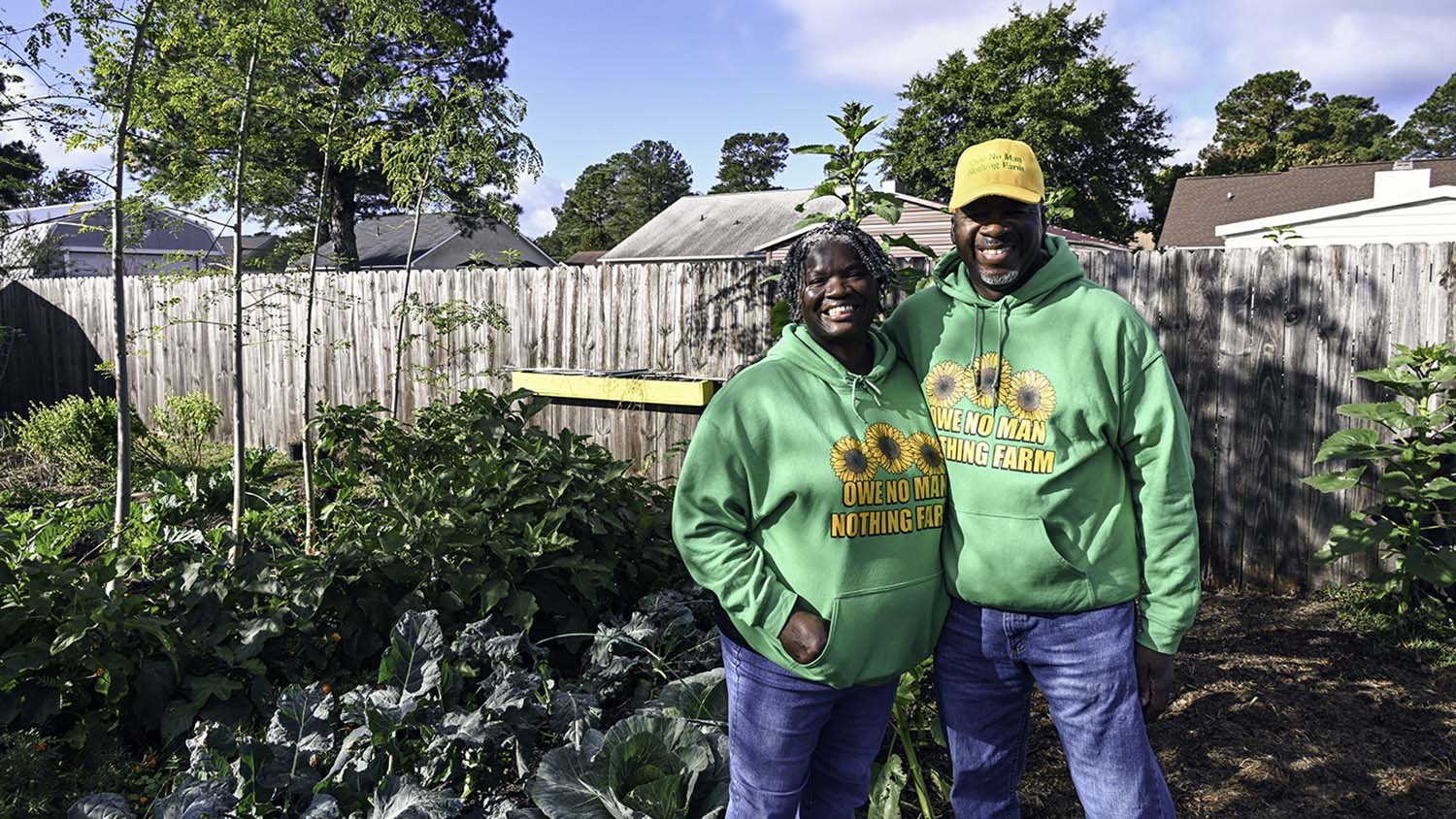
Micheal and Melinda Leach at their urban farm in Hoke County.
Micheal went through the course with his wife, Melinda, who is also a veteran. They operate Owe No Man Farm, an urban agriculture plot they operate at their home in Hoke County. They grow vegetables, medicinal plants and raise chickens for themselves and a dozen families that subscribe to their CSA.
“This is something that we are passionate about doing,” Micheal said. “We love to give to people, to bless somebody. Here’s a dozen eggs, here’s some vegetables to help you out. One of Melinda’s favorite scriptures in the Bible is owe no man nothing but to love him. (Romans 13:8) That’s where the name came from.”
Taking the class gave them the knowledge to expand their small plot into the half-acre space it currently occupies. They conduct annual farm days, which are a combination of agritourism and an opportunity to help the community by sharing their knowledge and passion.
“We are passing along some of the things that we’ve learned in that course to folks when they come out,” Micheal said.
Renewed Purpose
Micheal retired from the Army in 2019. After 31 years of service and numerous deployments, many of them hazardous, he was ready for a break.
“When I retired, I didn’t want to do anything,” he said. “I had reached the burnout phase.”
It is hard to go from serving your country, to jumping out of airplanes, to serving in combat roles overseas, to a life of leisure. Micheal quickly realized he needed a new purpose.
Melinda is an avid gardener. She was looking up information about soil testing on an Extension webpage and came across Soldiers to Agriculture.
“I was like, ‘We’re soldiers. I’m a veteran, he’s a veteran,’” she said. “I kept on reading. I was like, ‘Oh, this is for me.’”
She suggested she and Micheal attend together. Well, perhaps more than suggested.
“When they asked why are you here, my response was, ‘Because my wife said I was coming here,’” he said.

Melinda Leach tells Soldiers to Agriculture coordinator Corey Deibel about future plans. She and Micheal purchased 30 new chicks and will be expanding the chicken run.
Conversations with Deibel quickly changed his outlook. They talked about their common experiences in the Army, about the difficult transition to civilian life, and about agriculture as a means to heal from the wounds of war.
“This is therapy, this is healing,” Deibel said. “We get to see something go from basically cradle until harvest. We did that. That’s what we need as veterans. We are complex problem solvers and we like to see things from start to finish. Agriculture has helped take the statistic of 22 suicides a day of veterans down to 17. That is still too many, but if we save five or six people a day, that’s success. And that’s why this program is so important.”
Healing Through Agriculture
Fort Bragg is the largest Army base in the U.S. by population, with more than 260,000 people, including active-duty military, families and civilian employees. Some 300 service members retire from the post every month.
The average length of service for enlisted personnel is nearly seven years. Officers stay in longer. Nearly 20% of military members serve for 20 years, making them eligible for retirement benefits.
Related: Navy Veteran Pursues Horticulture
Whether they make it to retirement or leave after a couple of tours, they all have something in common. They served their country. And they separate from the military at a relatively young age. It isn’t like the stereotypical civilian career, when long-serving employees retire in their late 60s with a gold watch and a recliner.
“I was 20 when I was commissioned as a second lieutenant,” Rachel Cepis said. “This is really all I’ve known in my adult life. I’m 42 with children and a husband and I’ve already had a full career. I felt like I was in high school again trying to figure out, ‘OK, now what do I do?’ It’s a beautiful place to be in, but it is also very strange, a little uncomfortable, and sometimes maybe a little scary.”
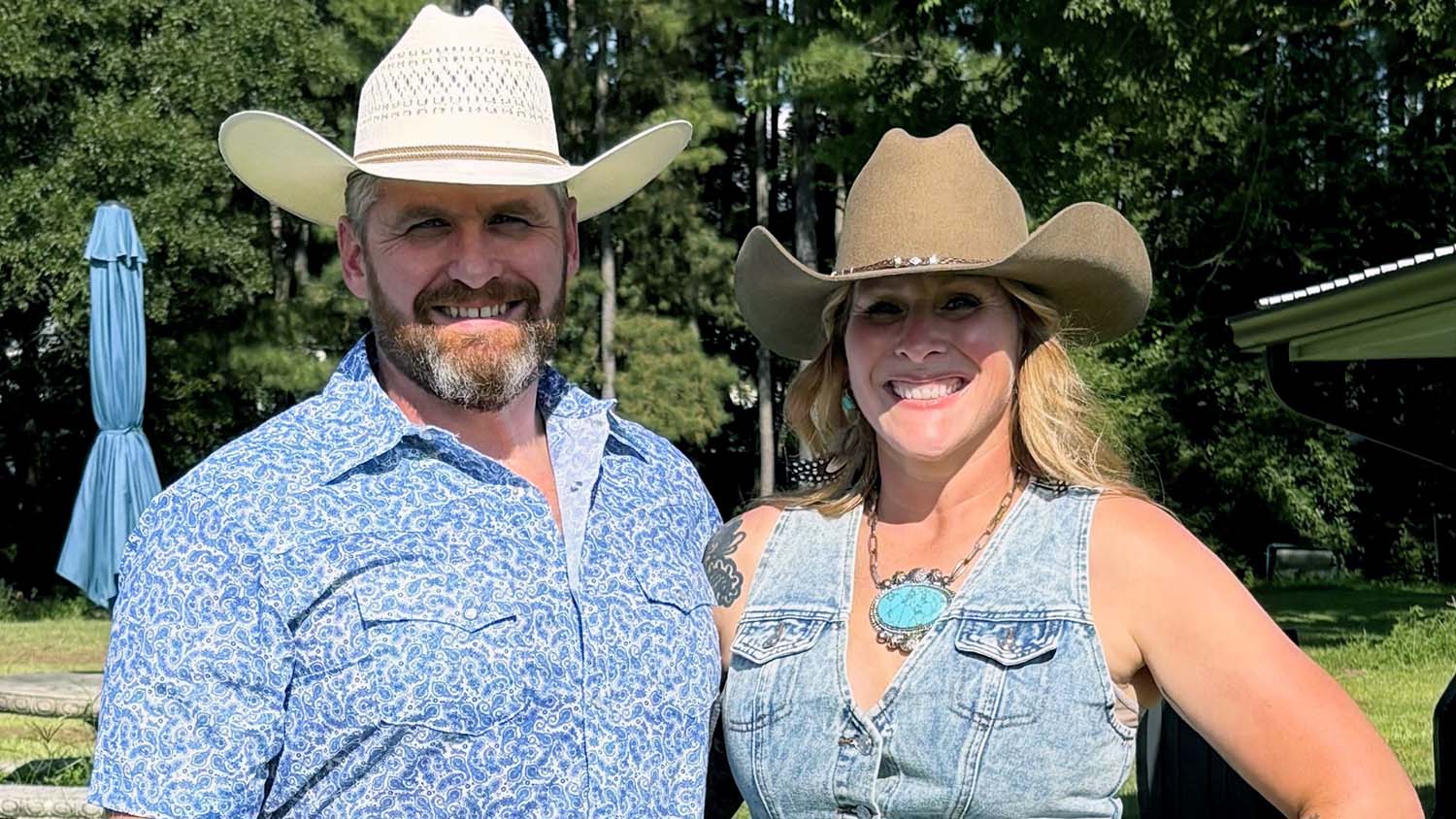
NC State Extension’s Soldiers to Agriculture program gave Harry Todd and Rachel Cepis focus for their second careers after they retire from the U.S. Army early in 2026. They plan to operate a beef cattle operation called Revelation Acres.
That is a common experience.
“Transitioning out of the military is a significantly emotional event,” Deibel said. “In the military, we literally know what we’re doing every day for six months to 12 months out. We know what we’re supposed to do, where we’re supposed to be, and what uniform we’re supposed to be in. When you get out, suddenly you’re on your own.”
The transition can be especially difficult for soldiers retiring after a 20-plus year career.
“What we call the 9/11 babies are retiring now,” Deibel said. “They joined the military after 9/11. All of a sudden we were deploying, and we were deploying for 20 years. They spent more time in foreign countries than they did in the U.S.”
Many of them suffer from unseen wounds. As many as 20% of the soldiers who served overseas in the war on terror suffer from post-traumatic stress disorder, a major contributing factor in the number of veteran suicides.
Harry Todd is one of them. He has served in the special forces for nearly 22 years, many of them overseas in dangerous situations.
“We have a lot of experiences that create trauma and PTSD,” he said. “Having animals and being responsible for a crop that you’re tending to, having something that relies on you on a daily basis, has proven to be extremely helpful for people with PTSD. I see the benefits of agriculture for soldiers. I think it is pretty significant.”
A Second Career
Harry and Rachel are both in the process of retiring from the Army. Rachel is a special operations civil affairs officer. She will retire as a lieutenant colonel at the end of February after serving for more than 20 years. Harry, who reached the rank of master sergeant, is separating in March.
Related: Agriculture Lessons for Deploying Soldiers
Both had an interest in agriculture. Harry was involved in 4-H and FFA during his childhood in Washington. His children are active in a chicken project through Extension’s 4-H program in Hoke County, and they have a couple of goats.
Rachel gardens as a hobby, and thought she might want to work with livestock.
“I was looking at transition programs and trying to figure out what I would be interested in doing,” she said. “I prayed a lot about it and my heart kept pulling me back to animals. Working with livestock is therapeutic for me.”
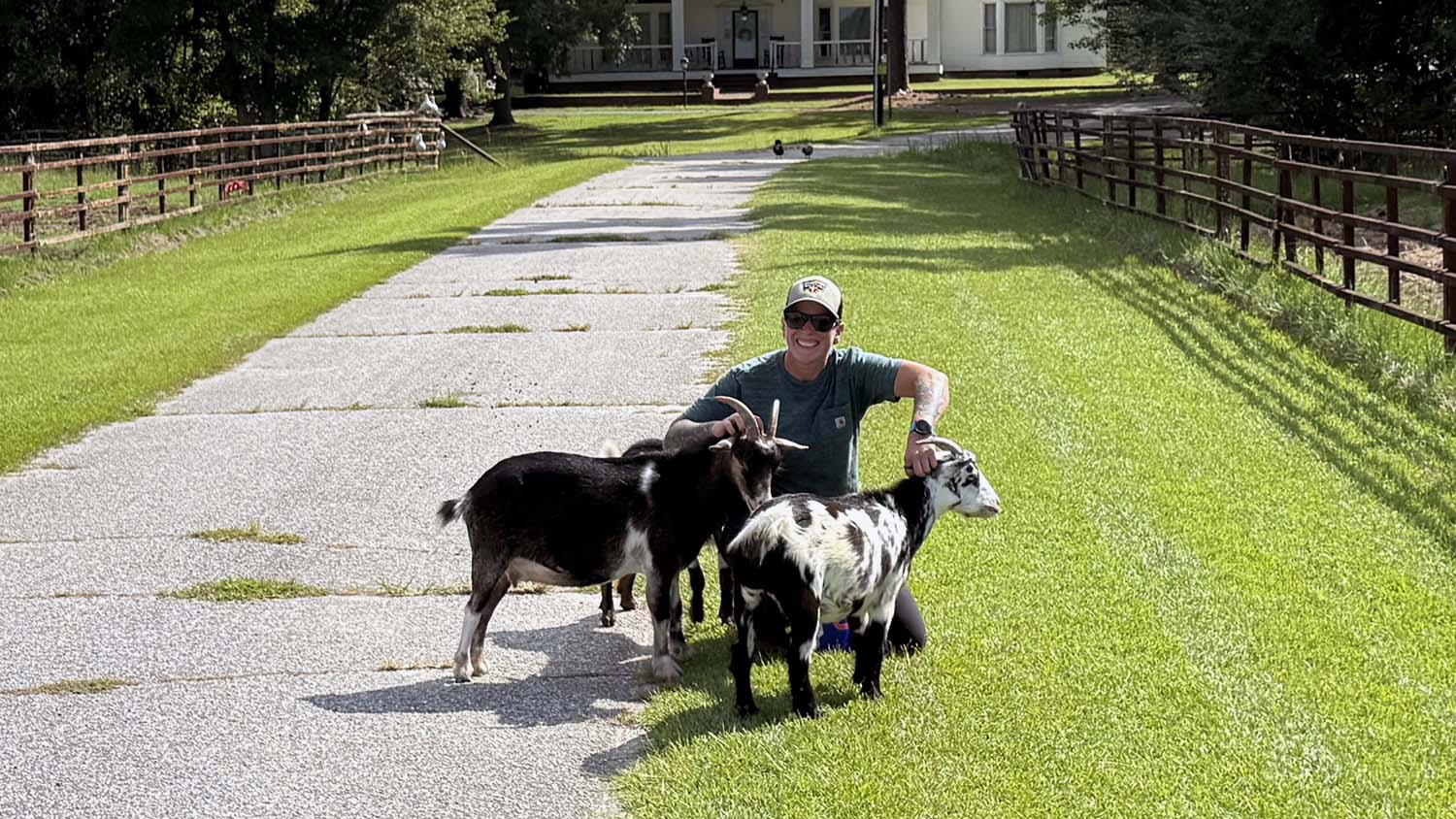
Rachel Cepis with a couple of goats. Many veterans find working with animals and agriculture a form of therapy after years of serving their country in hazardous situations.
After going through Soldiers to Agriculture, Harry and Rachel decided to purchase 46 acres in Hoke County and start a direct-to-consumer beef cattle operation called Revelation Acres.
“It exposed me to different areas of farming and it helped me narrow my focus,” Rachel said. “As I was learning new things and visiting different farms, I would ask myself, ‘Do I want to do that every day? Is that something that is going to bring me joy?’ I quickly found out that certain things, although I appreciate them, would not bring me joy every day.”
The lessons on having a business plan gave them a starting point for the new venture.
“Corey really emphasizes that you need to know your numbers, as well as emphasizing that you need to start small, test the system and then scale up,” Harry said. “It’s a whole lot easier to take care of two cows when you’re starting off than it is to manage 20 cows. Then you have to have the infrastructure established — the fencing, the water, the feed, where are you going to get your hay from? Are your fields established to support the animals right away or is it going to take a year? I have notepads and little stickies all over the place about how I’m going to do it, and it’s been exciting.”
Easing the Transition
Deibel can relate to the veterans who take the class. He was a combat engineer who served for 28 years. He knows what it is like to serve, and to transition out into agriculture.
“This class gives me an opportunity to talk about my passion for agriculture and help set them up for success,” Deibel said. “I’m able to relate to them, to talk to them, to listen. I’ve been in those arduous situations, those traumatic situations, whether it’s from IEDs or firefights or just the fact you were deployed. It lets me help them through the transition from military to civilian life, into that next mission.”
Related: Apprenticeship Program Helps Veterans Become Farmers
The program originally was housed within NC State’s Agricultural Institute. In 2023 it moved to Cumberland County, home to Fort Bragg.
“Having a more local presence at the Extension office here, close to the military base, just really made sense,” Childers said. “We do everything here in our office. We have an auditorium, we have a demonstration garden. We have a greenhouse and we have some space where we can do some gardening with them here.”
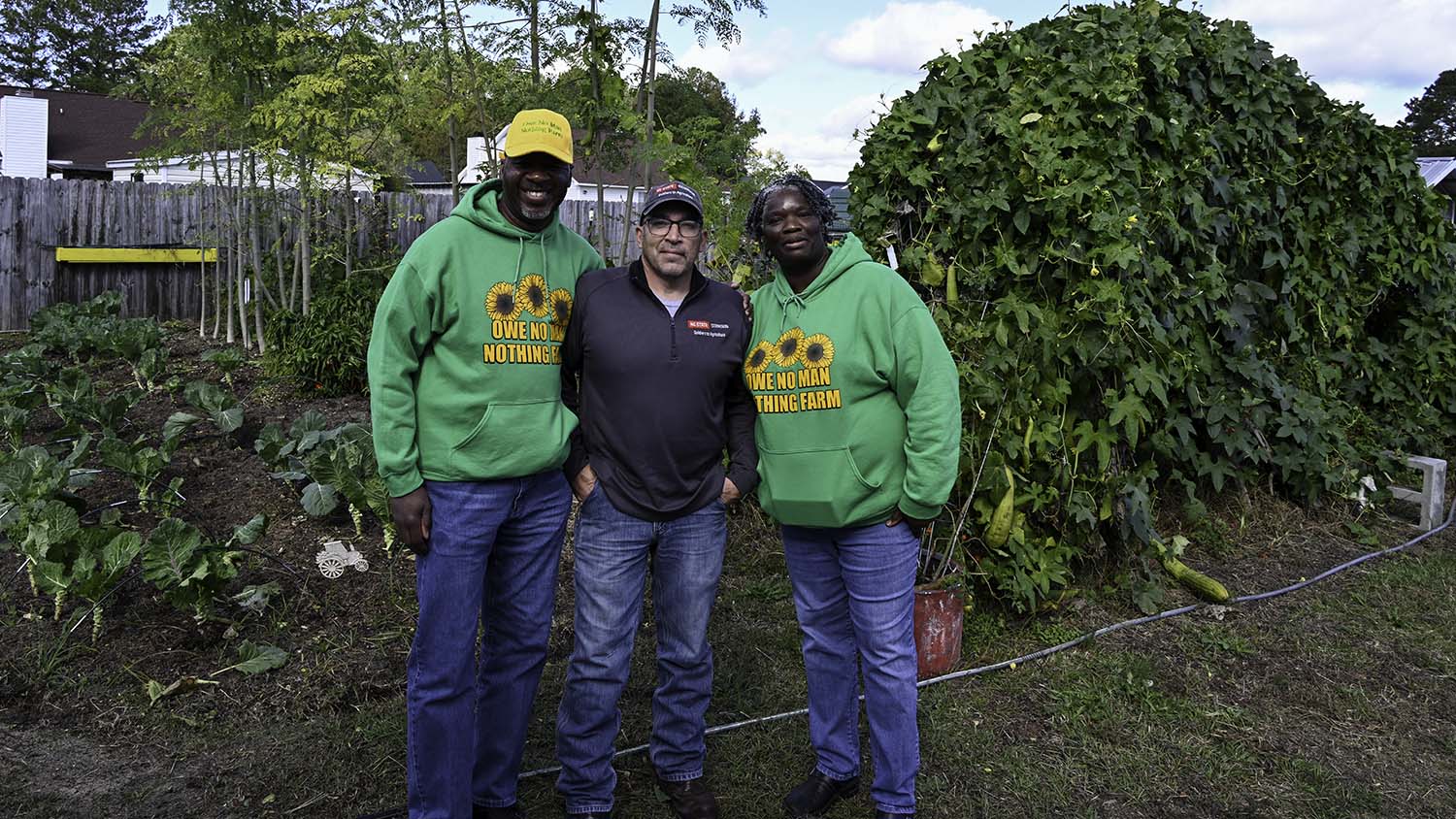
Micheal and Melina Leach with Corey Deibel, program coordinator for Soldiers to Agriculture, at the Leaches’ Owe No Man Nothing Farm. Extension personnel follow up with program participants, helping ensure their success.
Instruction also takes place at local farms, many of which offer internships for participants.
“A key to this program is the support we receive from the agricultural community,” Childers said. “When we go to a farm, we ask the farmer to tell their story, tell these folks how you got started. They can understand what that farmer went through to get to the point they’re at now. It didn’t happen overnight.”
Farming is not for the faint of heart. It is hard work and financially challenging. Asking farmers to tell their stories of the ups and downs is one way of ensuring the soldiers don’t have a false, romanticized notion of agriculture. Research-based lessons from Extension experts equip participants with the best chance of success, but there are no guarantees.
“We talk some students out of agriculture and that’s OK too,” Childers said. “We had a young lady and a young man who had already purchased animals and land and after taking our class they just said, ‘Wow, this is a lot more than what we expected.’ We certainly don’t want them to come from a very high stress job in the military and then get into a very high stress part of agriculture. We want them to really be able to make good decisions.”
A Team Effort
Deibel and Childers work with Fort Bragg’s Transition Assistance Program to identify and recruit soldiers within 180 days of separation.
“Because of our relationship with Fort Bragg, we are able to be that organization for those that want to go into agriculture,” Childers said. “They can be active duty. They can also be a veteran. And spouses are welcome to come.”
Deibel is the program coordinator, but the thrice-yearly courses involve just about everybody in the office.
“It’s an intense effort for an Extension office with all the other things you have going on,” Childers said. “All our staff assist with it. Our Family and Consumer Sciences agent provides food preservation classes. That’s always a highlight because we are seeing a lot of them want to go into homesteading.”
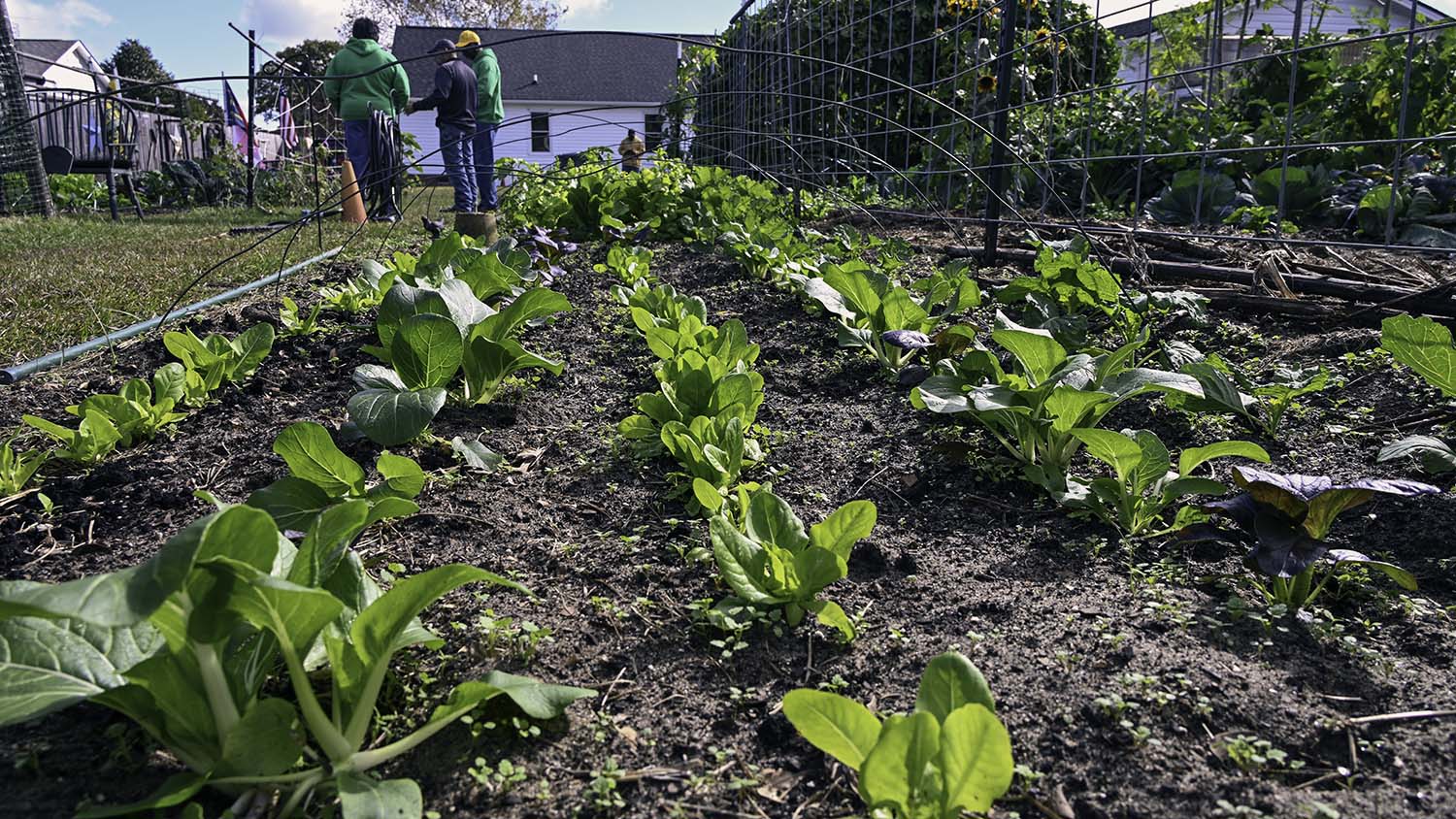
Lessons taught during the Soldiers to Agriculture course helped Micheal and Melinda Leach expand their urban farm. The program also gave Micheal a fresh purpose after serving his country for 31 years.
Reasons for joining the program vary. Some envision raising crops or livestock and making their living in agriculture. Others just want to provide for themselves and their families.
“Some of them don’t know if they are ready to start a farm, so they want to start something small like a homestead,” Childers said. “They want a few chickens, maybe some beehives, and to grow some fruits and vegetables. We really try to meet the students where they’re at in terms of their goal.”
The average class size is about 15 students. In addition to learning about agriculture and the importance of developing business plans, participants learn soft skills.
“Some of them have never had a civilian interview,” Childers said. “One of the aspects of the program is a mock interview. We go over interview skills, appropriate dress. They can be a little nervous about doing that, but at the end, they all thank us because it was such a learning experience for them.”
Many graduates have started homesteading operations. Several have become beekeepers. Others started businesses, including a cut flower operation and a forestry and mulching company. One was accepted into a USDA apprenticeship program. An Army mechanic who was a member of Micheal and Melinda’s class was offered a job on the spot during a visit to a farm equipment dealership. Some have enrolled in graduate degree programs after taking the class.
“We saw the blank stare on some of the soldiers that were in that class with us that didn’t know what they wanted to do,” Micheal said. “To see some of ’em walk out of that program after they found their niche, that’s very important, very vital.”
North Carolina is arguably the most military friendly state in the nation, with bases throughout the state and strong veterans support services. With the largest base in their backyard, Childers and her staff are grateful for the opportunity to serve those who served their country.
“It’s been a natural fit for us,” she said. “These are men and women who have sacrificed so much, and we can help them by teaching them about the industry we love so much. It’s a win-win for us, to give back to them. Working with the military community has certainly been one of the highlights of my career.”

